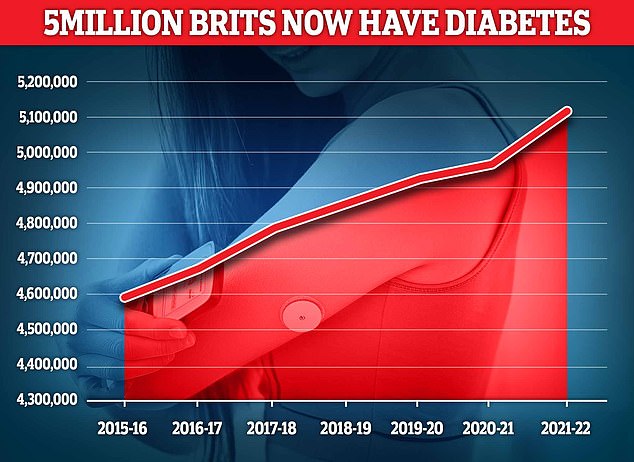Not getting enough sleep can lead to type 2 diabetes, study suggests.
Spending less than six hours each night was linked to a 16 percent higher risk of developing the condition.
And the odds remained high even when people ate healthily, suggesting that eating well cannot compensate for lack of sleep.
The Swedish researchers, who followed almost 250,000 Britons, said their findings “should not cause concern.”
Rather, they should act as a “reminder that sleep plays an important role in health.”

Spending less than six hours each night was linked to a 16 percent higher risk of developing the condition. And the odds remained high even when people ate healthily, suggesting that eating well cannot compensate for lack of sleep. The Swedish researchers, who tracked almost 250,000 Britons, said their findings “should not cause concern”.


Almost 4.3 million people were living with diabetes in 2021/22, according to the latest UK figures. And another 850,000 people have diabetes and are completely unaware of it, which is worrying because untreated type 2 diabetes can lead to complications such as heart disease and stroke.
Study author Dr Christian Benedict, a sleep researcher at Uppsala University, said: “In general, I recommend prioritizing sleep.”
“Although I understand that’s not always possible, especially as a father of four teenagers.”
Although they found that a healthy diet could not offset the risks of lack of sleep, experts acknowledged that people who sleep the recommended seven to nine hours “tend to consume less sugar and fewer calories.”
Dr. Benedict said this “likely contributes to better long-term metabolic health.”
Other factors that could increase the risk of type 2 diabetes in people who sleep poorly include leading a sedentary lifestyle, he added.
Dr Lucy Chambers, head of research communications at Diabetes UK, said: “No one thing causes type 2 diabetes.
“Genetics, age and body weight are all good contributing factors, but inadequate sleep is often an under-recognized factor.
“This research suggests that a healthy diet alone will not offset the increased risk of type 2 diabetes from too little sleep, and is a reminder that nutrition, exercise and sleep are essential components of good health.”
Other studies have linked lack of sleep to an increased risk of high blood pressure, heart disease, and even stroke.
Britons who took part in the study were asked about their sleeping patterns and dietary habits, including their consumption of meat, fish and processed vegetables.
Healthy eating was defined as consuming less than two servings of unprocessed red meat per week, or less than two of processed meat.
It also involved eating four or more tablespoons of vegetables a day, two or more pieces of fruit a day and two or more servings of seafood a week.
During a 12-year follow-up, 7,905 Britons were diagnosed with this disease.
Volunteers The results showed that those who followed the healthiest diets had a 25 percent lower risk of developing type 2 diabetes.
But writing in the diary JAMA NetworkDr. Benedict and his colleagues said the link between lack of sleep and type 2 diabetes “persisted even in people who followed a healthy diet.”
Britons who slept three to four hours each night were 41 percent more likely to have the condition, compared to those who slept a “normal” amount (defined as seven or eight hours).
Meanwhile, Britons who slept five hours a night had a 16 per cent higher risk of developing the condition.
There were “no statistically significant differences” between participants who reported a normal sleep duration and those who reported six hours.
The researchers adjusted for factors that could have skewed their findings, including weight, smoking, antidepressant use and activity levels.
They said more research was needed to understand why lack of sleep was associated with an increased risk of diabetes.
But they added: “The high prevalence of short sleepers may contribute to the projected global escalation in the prevalence of type 2 diabetes.”
Type 2 diabetes occurs when the body does not produce enough insulin or the insulin it does produce does not work properly.
This hormone is necessary to reduce blood sugar levels.
Having high blood sugar levels over time can lead to heart attacks and strokes, as well as eye, kidney, and foot problems.
Sufferers may need to review their diet, take daily medications, and have regular checkups.
Symptoms of this condition, which is diagnosed with a blood test, include excessive thirst, tiredness, and the need to urinate more frequently. But many people have no symptoms.
Almost 4.3 million people were living with diabetes in 2021/22, according to the latest UK figures.
And another 850,000 people have diabetes and are completely unaware of it.
About 90 percent of diabetes cases are type 2 diabetes, which is linked to obesity and is usually diagnosed in middle age, rather than type 1 diabetes, a genetic condition that is usually identified early in life.

